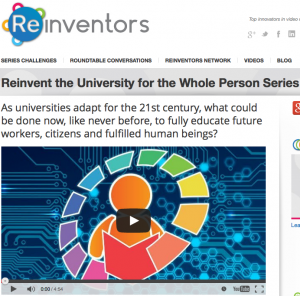News Story
Reinventing University for a Wholistic Education
Wednesday 4 Jun 2014
"As universities adapt for the 21st century, what could be done now, like never before, to fully educate future workers, citizens and fulfilled human beings?"
This is the very challenging question which Randy Bass is exploring in a 6-part series of video roundtables (each with a 10min summary) to Reinvent the University for the Whole Person. Wholistic learning analytics is a frontier research challenge in my view, so I was delighted to be invited to join one of the roundtables last night, considering the next step in digital/physical learning environments to help build the qualities that graduates need.
We had a fascinating conversation, building on the previous ones. Thanks to Randy, Reinventors.net (who do a great job facilitating such conversations), and my fellow Reinventors.
In more detail, this goal of the series is to reframe the conversation about the future of higher education…
The Roundtables
Each roundtable takes on a different aspect of the challenge. The roundtables build on each other with an eye of driving towards our desired outcomes.
Topics and sub-questions to be explored include:
- The Whole Opportunity: What is the bigger picture opportunity ahead for educating the whole person as universities get transformed in the 21st century?
- Next Skill Sets: What will be required for young and old to thrive in the coming digital, global world of many challenges? What is the role of an integrative education in transferring those skills?
- Next Physical & Virtual Environments: What are the design principles for future learning environments that strike the optimal balance between the virtual and local?
- New Metrics: How will we measure the impact of education, capturing the full range of outcomes we value? What are the “analytics” of an integrative education?
- Principles Driving Policy: What are the opportunities for shaping public policy for integrative education in a world that also needs more access, lower costs and more preparation for the workplace? How do we ensure that the focus is not elitist?
- Strategies for Organizational Change: What are the key mechanisms for change inside universities that will accelerate reinvention?
The Goals
The entire series is designed to move our collective thinking towards some specific goals, including:
- Reframe the discussion to include a compelling vision of educating the whole person in the 21st century, and why this is critical to shaping a better future.
- Highlight key strategies for moving the current system forward – from new metrics and organizational change strategies, to ending false debates between online and offline education.
- Empower change-makers in the field – from administrators and faculty, to the broader community of parents and alumni – with new ideas to accelerate the changes we want to see in the future.
Latest News
PhD Awarded for Groundbreaking Research on Game-Based Cyber Security Training
KMi at the Palace of Westminster: Exploring Blockchain for Society and Economy
OUAnalyse at the Digital Ethics Summit 2025: Advancing Responsible AI in Education

